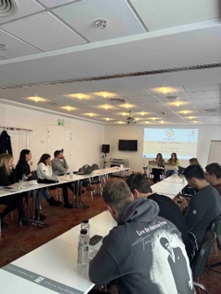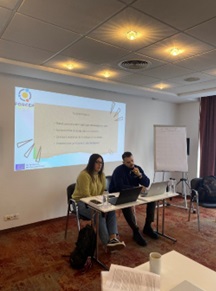FORCEP - Meeting in Bucharest
The study visit titled "Unemployed Active Citizenship in the European Decision Making," set to take place on January 26, 2024, at Hotel Continental Forum București in Bucharest, Romania, reflects a meticulous approach to exploring critical themes concerning unemployment and citizen engagement within the European Union framework.
The day commences with a formal registration period, followed by an introductory session featuring welcome addresses from project leaders and concise presentations outlining the diverse backgrounds of participating organizations. This initial segment sets the stage by establishing the overarching objectives of the study visit and the relevance of the FORCEP project in addressing pressing unemployment challenges across EU member states.
Subsequent sessions during the morning delve into detailed case studies from Romania, Hungary, and Slovenia, offering comprehensive insights into local approaches and strategies employed to tackle unemployment issues. These presentations are designed to provide a nuanced understanding of regional dynamics and initiatives aimed at fostering active citizenship among unemployed populations.
A pivotal panel discussion follows, focusing on the effective collaboration between local authorities and civic organizations to enhance community engagement. This interactive dialogue aims to uncover best practices and innovative methodologies for empowering citizens in decision-making processes at local and European levels.
After a brief coffee break, participants engage in a workshop session dedicated to designing and planning local events tailored to promote active citizenship. This practical exercise encourages attendees to brainstorm and develop actionable strategies that resonate with the specific needs and challenges faced by unemployed individuals across different EU regions.
The post-lunch session shifts focus to exploring strategic frameworks and technological advancements that can effectively bolster citizen participation in EU decision-making arenas. Keynote speeches and discussions underscore the role of policy initiatives and digital tools in bridging the gap between citizens and governance structures, fostering a more inclusive and participatory European democracy.
Parallel breakout sessions in the afternoon allow participants to analyze successful practices and case studies from various EU countries. These sessions facilitate in-depth discussions on the critical factors contributing to the success of citizen engagement initiatives, providing valuable insights for replication and adaptation in diverse socio-economic contexts.
The keynote address emphasized collaborative efforts between citizen groups and local authorities, showcasing exemplary initiatives that have effectively strengthened partnerships and civic participation. This address underscored the importance of such collaborations in fostering a more inclusive and participatory governance framework across European communities.
The day concludes with a networking dinner featuring Romanian cuisine, fostering informal exchanges and further enhancing the sense of community among participants. This social component not only reinforces professional relationships but also underscores the importance of cultural exchange in shaping cohesive European citizenship.
In essence, the study visit embodies a structured approach to fostering academic discourse and practical exchange on the complex intersections of unemployment, citizen engagement, and EU policy frameworks. By combining theoretical insights with practical applications, the event aims to equip participants with actionable strategies and innovative solutions to drive meaningful change in their local contexts and contribute to a more participatory European democracy.


EDS about the meeting in Bucharest

